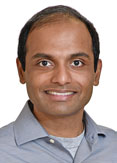Deep Learning for Alzheimer’s Disease Diagnosis and Assessment

Wed@Hariri Meet Our Fellows Series
Vijaya Kolachalama, Assistant Professor of Medicine, MED

When:
Wednesday, February 27, 2019
Event Start Time (including reception before): 2:45 pm
Event End Time (including reception after): 4:30 pm
Where:
Hariri Institute for Computing
111 Cummington Mall, Seminar Room, Room 180
Abstract: An estimated 5.7 million Americans of all ages were living with Alzheimer’s disease (AD) in 2018. While there is not yet any available drug treatment for the disease, research indicates that delaying onset by just 5 years will cut an individual’s risk for diagnosis by almost 50%. Early diagnosis and accurate identification of risk factors that are amenable to intervention at the preclinical stage represents the most effective method for combatting AD. Machine learning and image processing algorithms are transforming the way by which medical images are analyzed to uncover hidden patterns and facilitate early AD diagnosis as well as to improve the delivery and effectiveness of patient care. We develop advanced deep learning frameworks for quantitative assessment of MR imaging data to assist the radiology and the medical research communities. In this talk, I will present few examples in this area to discuss ongoing work in our laboratory that is focused on neuroimaging data as one form of input to deep neural networks and show how we could associate them with several clinical outcomes of interest.
Bio: Vijaya Kolachalama is a faculty member within the Section of Computational Biomedicine, Department of Medicine, Boston University School of Medicine. Research in his group is focused on developing advanced machine learning and image processing algorithms for disease risk assessment and designing software technologies to assist therapeutic development and clinical decision-making. Before joining BU, Dr. Kolachalama held appointments as a Postdoctoral Associate at MIT, as an ORISE Fellow at the US Food and Drug Administration, and as a Principal Member of Technical Staff at the Charles Stark Draper Laboratory. He has a bachelor’s degree in Aerospace Engineering from the Indian Institute of Technology, Kharagpur, India and a PhD in Mechanical Engineering from the University of Southampton, UK. He was selected as an Institute Research Fellow in 2017 and as an Institute Junior Faculty Fellow in 2018.